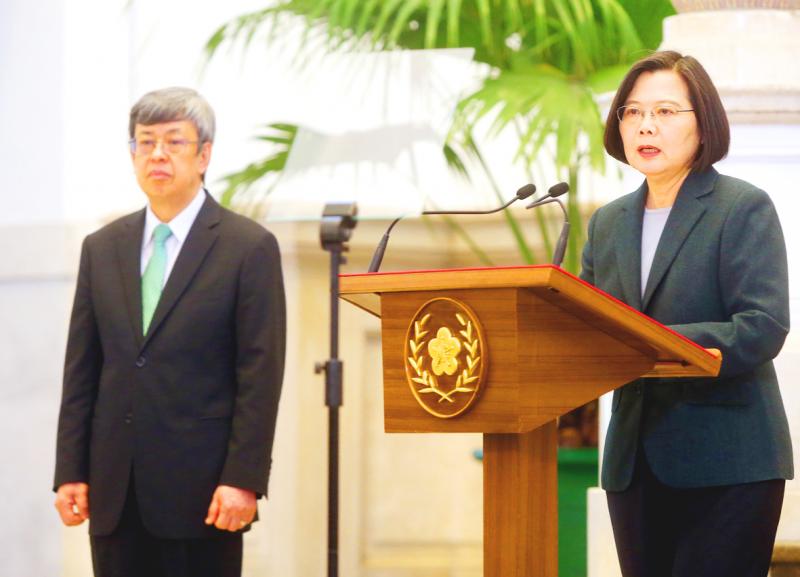Amid doubts caused by the relatively low number of COVID-19 tests conducted in Taiwan, Vice President Chen Chien-jen (陳建仁) has defended the nation’s practices, saying that large volumes of tests are only needed when sources of infection cannot be traced.
As of Wednesday last week, Taiwan had conducted 20,014 tests for the novel coronavirus, compared with 307,024 by South Korea, raising questions over whether Taiwan’s testing has been aggressive enough.
Minister of Health and Welfare Chen Shih-chung (陳時中), who heads the Central Epidemic Command Center, on Saturday last week rejected a call to conduct more COVID-19 testing, as many people have requested to be tested at their own expense.

Photo: CNA
He said that such a practice could increase the number of false negative results.
More testing “might not only not help efforts to stem the outbreak, it could even create a quarantine loophole,” Chen Shih-chung said, adding that those with false negative results could move about without taking precautions, thinking that they are free of the virus, while infecting others.
Chen Chien-jen, an epidemiologist by training, on Monday said on Facebook that the prevalence of the novel coronavirus in Taiwan is less than one per 100,000 people, and that “only a few cases have unknown sources.”
As such, the government has concentrated its testing on those who have come in contact with infected patients and those categorized as highly vulnerable to COVID-19, he said.
“Such a practice guarantees that the tests are proper and efficient, and in line with cost-benefit principles,” the vice president said.
In addition, he provided data from 13 nations that have conducted at least 15,000 tests on their volume of testing, the number of positive cases found and the prevalence of the disease in their populations.
The figures generally showed that “the lower the rate of positive tests, the broader the coverage of tests of potentially infected people,” Chen Chien-jen.
Of the 13 nations, Taiwan had five positive results for every 1,000 tests conducted, trailing only the United Arab Emirates at 0.8 positive results per 1,000 tests and Russia with 1.2 positive results per 1,000 tests, he said.
Taiwan had 0.45 infections per 100,000 people, the second-lowest ratio after Russia’s 0.14 infections per 100,000, he added.
However, Chen Chien-jen acknowledged that the correlation between positive test rates and infection rates per 100,000 people was not absolute, citing statistics from France, Belgium and South Korea, where there were about 16 infections per 100,000 people, but their positive test rates varied greatly.
While South Korea saw 27.9 positive results per 1,000 tests, Belgium reported 80.9 positive results per 1,000 tests and France 167.4 positives per 1,000 tests.
The figures suggest that South Korea and Belgium conducted more tests on people who were not infected, while France tested more people who were infected, Chen Chien-jen said.
The center said that COVID-19 tests are being conducted on “high-risk” subjects, divided into two groups: those who have come in contact with foreigners who had respiratory symptoms and a fever; and people with pneumonia or who have a fever and respiratory symptoms after returning from countries for which the highest level of travel advisory has been issued.

The Grand Hotel Taipei on Saturday confirmed that its information system had been illegally accessed and expressed its deepest apologies for the concern it has caused its customers, adding that the issue is being investigated by the Ministry of Justice Investigation Bureau. The hotel said that on Tuesday last week, it had discovered an external illegal intrusion into its information system. An initial digital forensic investigation confirmed that parts of the system had been accessed, it said, adding that the possibility that some customer data were stolen and leaked could not be ruled out. The actual scope and content of the affected data

DO THEY BITE IT? Cats have better memories than people might think, but their motivation is based entirely around the chance of getting fed Cats can remember the identity of the people who fed them the day before, Taipei-based veterinarians said on Friday, debunking a popular myth that cats have a short memory. If a stray does not recognize the person who fed them the previous day, it is likely because they are not carrying food and the cat has no reason to recognize them, said Wu Chou Animal Hospital head Chen Chen-huan (陳震寰). “When cats come to a human bearing food, it is coming for the food, not the person,” he said. “The food is the key.” Since the cat’s attention is on the food, it

A New York-based NGO has launched a global initiative to rename the nation’s overseas missions, most of which operate under the name "Taipei," to "Taiwan Representative Office (TRO)," according to a news release. Ming Chiang (江明信), CEO of Hello Taiwan, announced the campaign at a news conference in Berlin on Monday, coinciding with the World Forum held from Monday through Wednesday, the institution stated in the release. Speaking at the event, Democratic Progressive Party Legislator Huang Jie (黃捷) said she believed this renaming campaign would enable the international community to see Taiwan

TOO DANGEROUS: The families agreed to suspend crewed recovery efforts that could put rescuers in danger from volcanic gases and unstable terrain The bodies of two Taiwanese tourists and a Japanese pilot have been located inside a volcanic crater, Japanese authorities said yesterday, nearly a month after a sightseeing helicopter crashed during a flight over southwestern Japan. Drone footage taken at the site showed three bodies near the wreckage of the aircraft inside a crater on Mount Aso in Kumamoto Prefecture, police and fire officials said. The helicopter went missing on Jan. 20 and was later found on a steep slope inside the Nakadake No. 1 Crater, about 50m below the rim. Authorities said that conditions at the site made survival highly unlikely, and ruled